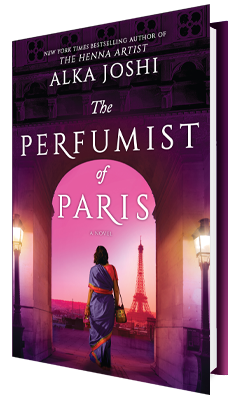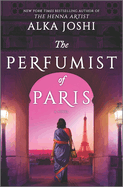The Perfumist of Paris
by Alka Joshi
Alka Joshi's lush third novel, The Perfumist of Paris, takes readers on a multi-sensory journey from a pristine Parisian perfume lab to the bustling markets of Agra in India. Following the story that began with The Henna Artist and continued with The Secret Keeper of Jaipur, Joshi explores the ways in which her characters have evolved, and the impact of long-held family secrets on their lives several decades later.
Radha Fontaine (whom readers met in The Henna Artist) spent her childhood following her older sister, Lakshmi, around Jaipur, mixing henna for Lakshmi's clients and--eventually--getting tangled up with a rich, careless boy. As the title of this third book indicates, she's now a grown woman and a budding perfumist in 1974 Paris, married with two young daughters, Asha and Shanti. Radha loves her work, though her dedication to it is increasingly a source of conflict with her French architect husband, Pierre. Determined to prove herself at work, she accepts an exciting assignment that requires her to travel back to India, and she enlists Lakshmi's help to track down rare ingredients that will make her perfume something special. Lakshmi, now happily married and working alongside her doctor husband in Shimla, joins Radha on a trip to Agra, where they visit a pair of aging courtesans who know all about perfume--and managing difficult men.
During her time in Agra, Radha is able not only to find key ingredients for her perfume, but to reconnect with Lakshmi. Readers who are familiar with Joshi's world will appreciate the glimpse into Lakshmi's life in Shimla with her husband, Dr. Jay. The two sisters are also able to talk about some difficult things from their past--to reckon with the impossible choices they were forced to make, and to begin to move forward. As Lakshmi reminds Radha, the measure of a person cannot always be found in the past or the future, but in "the fundamental changes we make within ourselves over a lifetime."
Though Radha's story is set nearly half a century ago, her struggle to carve out a life for herself while fulfilling her role in her family feels sharply contemporary. Pierre's entrenched, traditional ideas of a woman's role and responsibility to her family cause him to clash with Radha, who grew up watching Lakshmi model entrepreneurship and independence as a single woman in Jaipur. Radha's stern French mother-in-law, Florence, also doesn't hesitate to make her disapproval known. However, a series of revelations changes the relationship between the two women, and ultimately makes Florence a much more sympathetic character.
At work, Radha has another feminist example in master perfumer Delphine, who expects excellence from all her perfumers but also gives Radha occasional wise (if oblique) advice. When Radha travels to Agra with Lakshmi, the courtesans--Lakshmi's old friends--model a different type of female independence. Aware of the stereotypes around their profession, but sharp-eyed and fiercely proud, these elderly women also help inspire Radha to continue forging her own path. When Radha suspects someone is sabotaging her major perfume project, she must find the culprit to protect not only herself, but the courtesans, who have given generously of their time, knowledge and connections.
Radha longs to help her daughters connect to the Indian heritage they share, but is unsure of how to bring it into their lives. Her wrestling with this tension also prompts some self-reflection on how hard she has tried to assimilate to her new culture: "Sometimes, I marvel at how different my life is today. Back in Ajar, I slept on a hard-packed dirt floor instead of a down mattress. I had to draw water from a well and heat the water over a clay hearth. Here, I turn on a tap and hot water magically appears. After thirteen years I've grown used to these daily comforts." When she returns to Paris, Radha must decide what kind of changes--and sacrifices--she is willing to make to have the life she wants, and tension in her marriage threatens to boil over, just as a secret from her past in India shows up in her living room.
Joshi's narrative bursts with sensory details, including the scents of the perfume ingredients Radha creates and the mid-century details of the apartment she shares with Pierre and the girls. The cacophony of color, sound and scent in India contrasts sharply with the sterility of Radha's perfume lab, but Joshi (like Radha) moves skillfully between settings. Equally compelling is Radha's constant inner dialogue about balancing work, marriage and motherhood: she wants to be a good wife to Pierre and an attentive mother to her daughters, but she also needs the satisfaction and creative outlet provided by her job.
Beautifully written and thought-provoking, The Perfumist of Paris continues a compelling family saga, immerses readers in the world of perfume, and asks important questions about the desires and possibilities available to women. --Katie Noah Gibson








